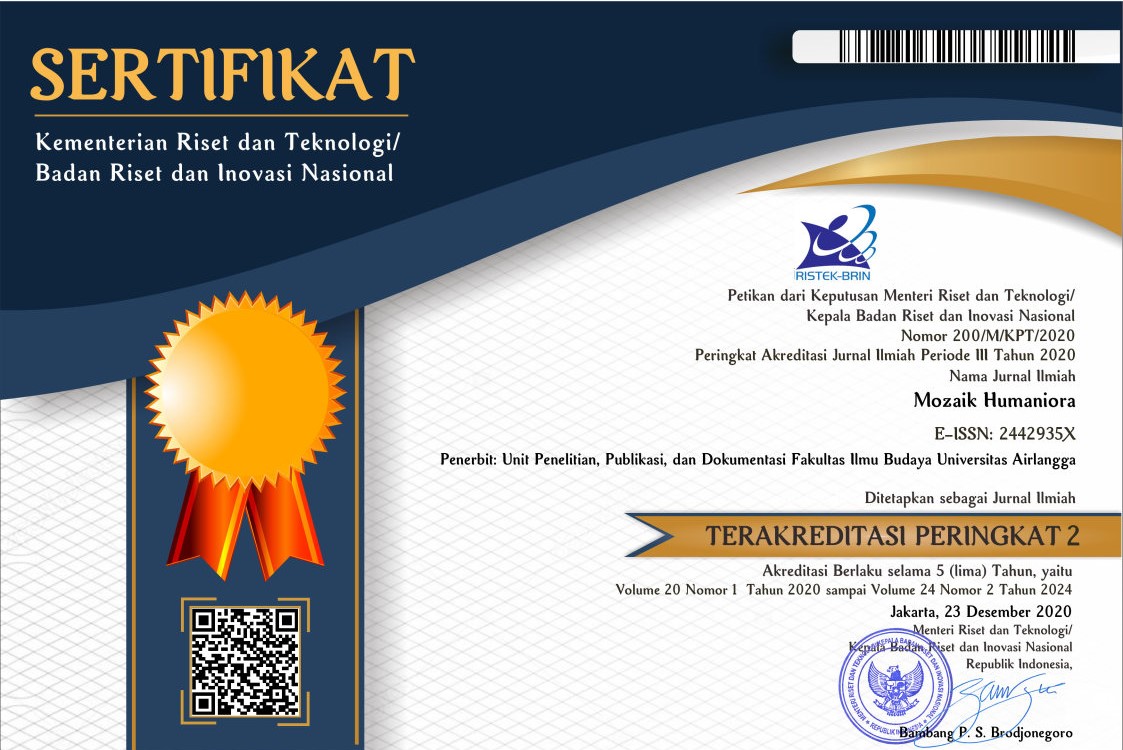The Post-Modification of Noun Phrase: Types and Distributions on Abstracts of Local and International Journals
Downloads
Focusing on single and multiple post-modification of noun phrase complexity in academic writing, this study adopted Berlage's (2014) types of single and multiple post-modification of noun phrase to investigate the types and distributionof noun phrase on 15 abstracts of accredited local journal and 15 international journal indexed by Scopus. Subjects, objects, and complements are coded manually and then extracted for noun phrases. The findings revealed that both groups of writers heavily relied on noun phrase involving prepositional phrase in single-post modification and noun phrase involving prepositional phrase(s) and coordination(s) in multiple-post modification. This finding may give contribution to EFL teachers and material developers in order to provide information and materials about NP post modifiers that can be used in academic writing.
Adebileje, Adebola. 2016. "Forms and Functions of the English Noun Phrase in Selected Nigerian Texts Adebola Adebileje ( Phd )” 21 (2): 45–49. https://doi.org/10.9790/0837-21214549.
Akinlotan, Mayowa. 2019. "Noun Phrase Complexity in Nigerian English” 33 (3): 31–38. https://doi.org/10.1017/S0266078416000626.
Berlage, Eva. 2013. Noun Phrase Complexity in English. Noun Phrase Complexity in English. https://doi.org/10.1017/CBO9781139057684.
Biber, D. E., & Gray, B. (2011). Grammatical change in the noun phrase: The influence of written language use. English Language and Linguistics, 15(2), 223-250. https://doi.org/10.1017/S1360674311000025
Biber, D., Johansson, S., Leech, G., Conrad, S., & Finegan, E. (1999). Longman grammar of spoken and written English. Edinburgh: Pearson Education Limited.
Haan, Pieter De. 2016. "Nouns and Noun Phrases in Advanced Dutch EFL Writing : From Quantitative Nouns and Noun Phrases in Advanced Dutch EFL Writing : From Quantitative to Qualitative Longitudinal Data Analysis,” no. January 2015.
Hidayati, Kuni Hikmah. 2018. "Teaching Writing to EFL Learners : An Investigation of Challenges Confronted by Indonesian Teachers” 4 (1): 21–31.
Hinkel, Eli, and Sandra Fotos. 2002. "New Perspectives on Grammar Teaching in Second Language Classrooms.” ESL & Applied Linguistics Professional Series. https://doi.org/10.2307/3588337.
Li, Lan. 2017. "Noun Phrase Complexity in EFL Academic Writing : A Corpus-Based Study of The Journal of Asia TEFL Noun Phrase Complexity in EFL Academic Writing : A Corpus-Based Study,” no. February 2016. https://doi.org/10.18823/asiatefl.2016.13.1.1.48.
Parkinson, Jean, and Jill Musgrave. 2014. "Development of Noun Phrase Complexity in the Writing of English for Academic Purposes Students.” Journal of English for Academic Purposes 14: 48–59. https://doi.org/10.1016/j.jeap.2013.12.001.
Xu, Lirong. 2019. "Noun Phrase Complexity in Integrated Writing Produced by Advanced Chinese EFL Learners” 8 (1): 31–51.
Titscher, Stefan, Michael Meyer, Ruth Wodak, and Eva Vetter. 2000. Methods of Text and Discourse Analysis. London: SAGE Publication.
Miles, M. B., & Huberman, A. M. 1994. Qualitative data analysis: An expanded sourcebook (2nd ed.). Sage Publications, Inc.

Mozaik Humaniora is licensed under a Creative Commons Attribution-ShareAlike 4.0 International License. Both authors and Mozaik Humaniora agree with the following attribution of journal:
1. Copyright of this journal is possession of Author, by the knowledge of the Editorial Board and Journal Manager, while the moral right of the publication belongs to the author.
2. The journal allows the author(s) to retain publishing rights without restrictions
3. The legal formal aspect of journal publication accessibility refers to Creative Commons Attribution Share-Alike (CC BY-SA).
4. The Creative Commons Attribution Share-Alike (CC BY-SA) license allows re-distribution and re-use of a licensed work on the conditions that the creator is appropriately credited and that any derivative work is made available under "the same, similar or a compatible license”. Other than the conditions mentioned above, the editorial board is not responsible for copyright violation.


















